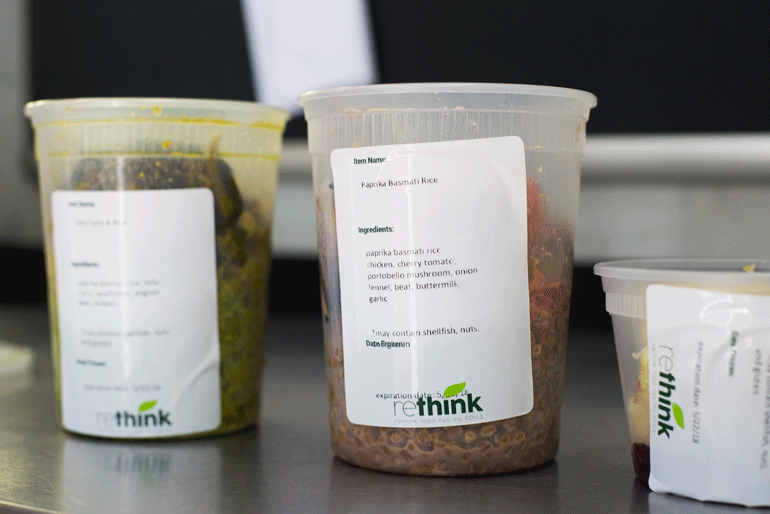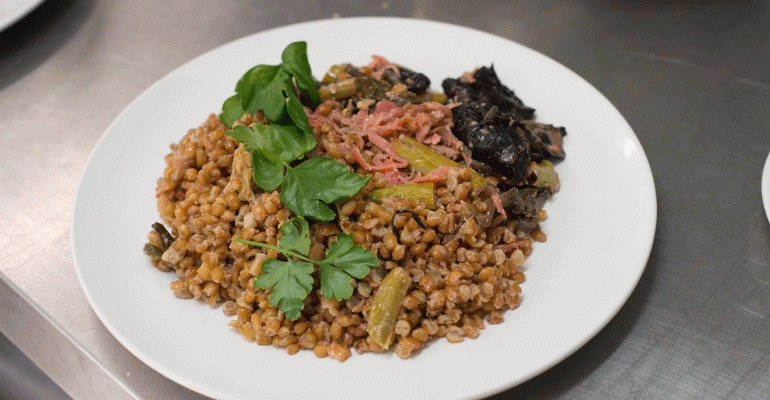Why don’t more restaurants donate leftover food?
The question is often asked, but not often by those in the industry familiar with the hurdles kitchens face when trying to donate.
For one thing, hunger-relief organizations are usually looking for uncooked food, and the typical pick up times are during operating hours, long before a kitchen even knows what will be left over.
Then there’s the fear the restaurants may be liable if there are any problems with the food after it leaves the kitchen. These complications drive restaurants away from donation and toward wasting tons of food.
Matt Jozwiak knew there was a better way.
“It’s not like restaurants don’t want to donate,” he said. “It’s not like they love throwing food away when people are hungry.”

Jozwiak would know. He worked in high-end restaurants in New York, like sister-concepts Nomad and Eleven Madison Park, before co-founding ReThink in 2017, an organization that delivers prepared meals to the needy by using leftover food from some of the very restaurants where Jozwiak used to cook.
Citywide, about approximately 1.4 million people struggle with hunger, according to the latest report from Hunger Free America.
Each year about 63 million tons of food is wasted annually in the U.S., according to the non-profit ReFED. The restaurant industry alone generates about 11.4 million tons of food waste annually at a cost of about $25 billion per year.
While many restaurants can reduce their waste to an extent, Jozwiak knows that some food waste is the cost of doing business.
At fine-dining restaurants, diners expect perfect looking vegetables, for example, so the more-homely produce gets wasted. At fast-casual restaurants, diners expect to be served fresh food in minutes, so bins of ingredients are prepared for the lunch rush, and what’s not eaten can’t be served the next day.
“We’re not mad at people who are wasting,” said Jozwiak. “It’s not a bad thing. There just needs to be a thing on the other side of that that catches it. But currently, there’s not. So, we started it.”
The dishes Jozwiak and his team create might be more at home on the menu of a fine-dining or fast-casual restaurant. On a recent afternoon paprika basmati rice with chicken, Portobello mushrooms and fennel was being doled out into plastic quarts to be donated to St. Stephen’s Outreach in Brooklyn, a soup kitchen and food pantry that is ReThink’s most consistent drop-off spot.
The meals are made in a shared catering kitchen in Brooklyn. Currently, ReThink picks up ingredients from seven restaurants including The Grill, a the new restaurant from Major Food Group; as well as Eleven Madison Park, the Nomad, and Made Nice, all owned by the Make it Nice restaurant group. ReThink also picks up food from Square Roots, an urban farm, and Fleishers Craft Butchery.
ReThink regularly picks up ingredients like vegetable puree and butter sauces from Nomad, Jozwiak’s old stomping grounds.

Michael Reilly, chef de cuisine at Nomad, was intrigued by Jozwiak’s vision and how he planned to accommodate each restaurant he worked with.
“His team is very much all from restaurants or involved in the industry somehow, and they understand how to properly use something,” said Reilly.
And ReThink’s team is able to come in after service around 11:30 p.m., while Reilly found that other charity organizations were often only available for pick up or drop off during normal business hours.
“He really customized it for us,” Reilly said.
Nomad already used pint containers for a majority of their mise en place and prep, so they keep the leftovers in the pint containers, ReThink picks them up, and replaces the containers.
“Generally speaking what we’re giving him are things that we’ve prepped that day, or at the latest the day before, that don’t necessarily meet our standards for someone paying something like $40 for a plate, but are still delicious,” said Reilly. “For example, a green puree, the color will start to change on it and it will turn a slightly less bright green. It’s still delicious and edible, but it doesn’t pop on the plate as much. So that’s something he would take.”
ReThink is able to alleviate liability concerns for restaurants with a basic legal agreement. “We indemnify them from any liability, and that’s what restaurants want to see,” Jozwiak said.
But he’s also quick to point out that — thanks to the federal Bill Emerson Good Samaritan Food Donation Act passed in 1996 — anyone who donates food in good faith is free from criminal and civil liability. Still, concerns over potential restaurant liability persist, and the agreement Jozwiak created puts operators at ease.
“What Matt’s group has done is basically taken all of that out of our hands,” Reilly said. “He makes it as easy as possible for the restaurant to participate.”
Jozwiak also worked to make donating financially profitable for restaurants.
The tax write-off offered by many non-profits for donations isn’t much of a motivation, said Jozwiak. But restaurants that work with ReThink receive a tax write-off based on the depreciating value of the food.
As Jozwiak sees it, why is a meal worth $20 while a restaurant is open and nearly zero a few minutes after closing time?
Jozwiak puts a “significant” value to the leftovers thus making the tax write-off an added incentive for operators.
“Take away the amazing part that you’re feeding people, it’s a huge benefit with the tax write-off alone, and how professional and easy they make it for us,” said Reilly.
Contact Gloria Dawson at [email protected]
Follow her on Twitter: @gloriadawson





